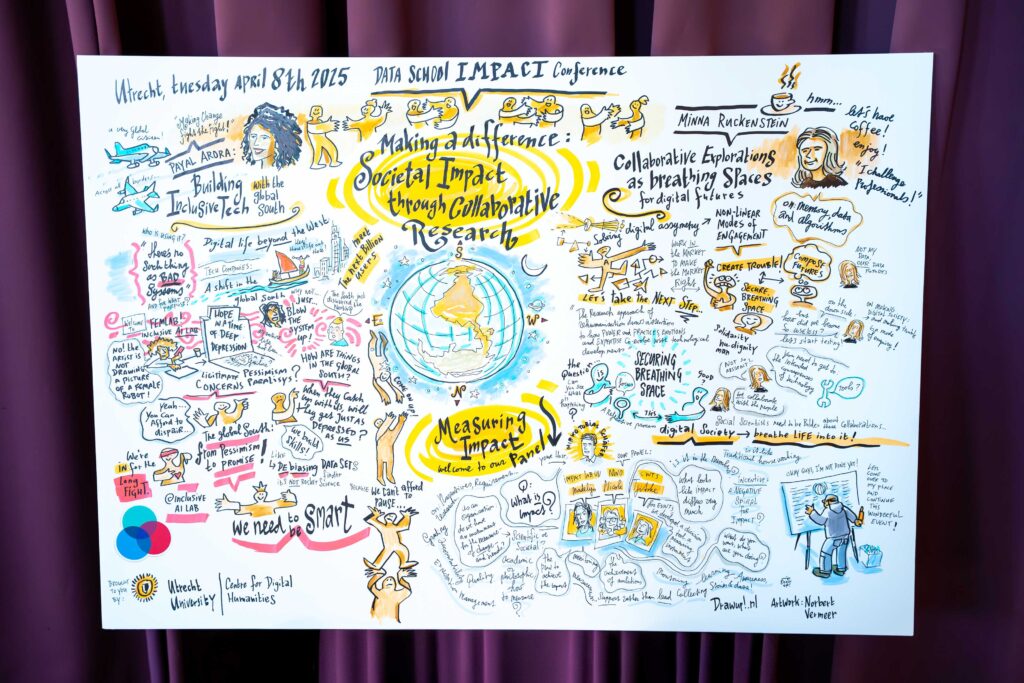Recap of Data School’s Impact Conference
Two Days of Collaboration, Knowledge Exchange, and Difference Making
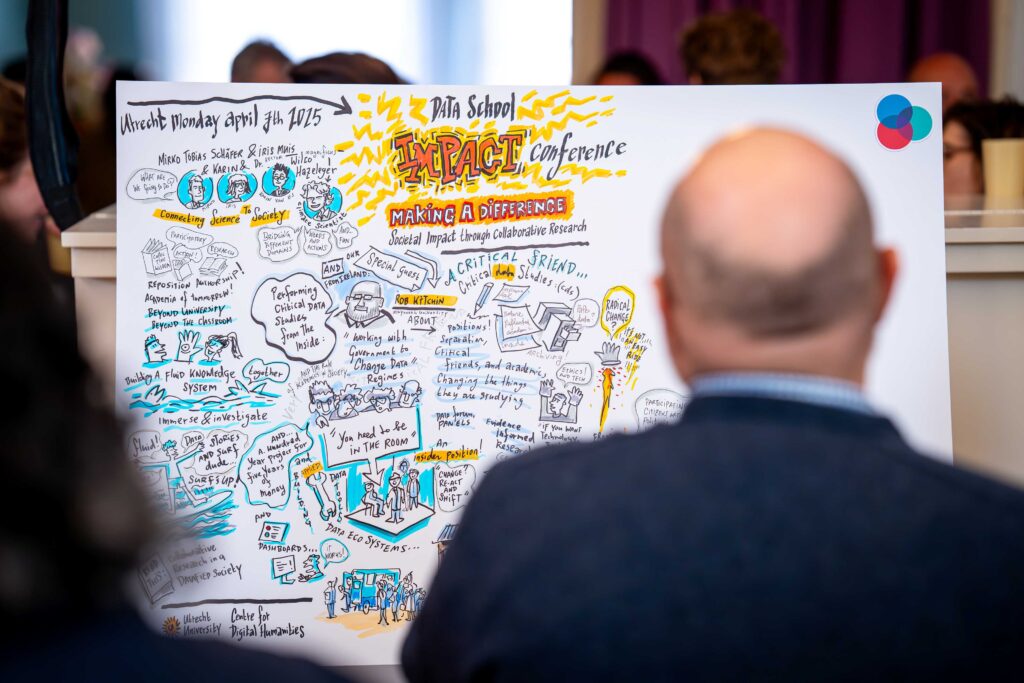
How can scholars and practitioners join forces to bridge the gap between academic inquiry and urgent societal challenges? What roadblocks stand in the way of translating research into practical change, and how might these roadblocks be reimagined as opportunities for cross-sector collaboration? Most significantly, how can such collaborative research foster more diverse, equitable, and inclusive responses to the intricacies of our data-driven society – and lead to meaningful, lasting impact? These were among the central questions at the heart of Data School’s workshop-driven conference Making a Difference: Societal Impact through Collaborative Research that took place on 7 & 8 April 2025 in Utrecht, the Netherlands.
A collaborative opening
The conference opened with a compelling address from Prof. dr. Wilco Hazeleger, Rector Magnificus of Utrecht University. He emphasised how collaborative research lies at the core of Utrecht University’s strategic plan and is essential for tackling complex, global, and, above all, urgent societal challenges. As he aptly put it during his opening remarks:
“Whether we are facing climate crises or broader societal transformations – even within our institutional environments – we have learnt one thing for sure: no single discipline, no isolated group of people, can tackle these challenges alone. We must collaborate. That is exactly what Data School embodies.”
Prof. dr. Wilco Hazeleger
Following this, dr. Mirko Tobias Schäfer took the stage to unpack the motivations behind Data School’s commitment to collaborative research, tracing how these motivations not only shaped the conference itself but also led to the publication of the book Collaborative Research in the Datafied Society: Methods & Practices for Investigation & Intervention (2024, Amsterdam University Press). In his words:
“We believe working together like this, builds mutual knowledge transfer. Public engagement, impact, and professional education all contribute to a dynamic, fluid knowledge ecosystem, where universities are just one part of a larger network of contributors. That is part of Data School’s model: we don’t just ‘preach’ in lecture halls – we engage in the field! First, we immerse, then we investigate, and only after that we can intervene meaningfully and develop novel formats, whether educational, problem-solving, or research oriented.”
Dr. Mirko Tobias Schäfer
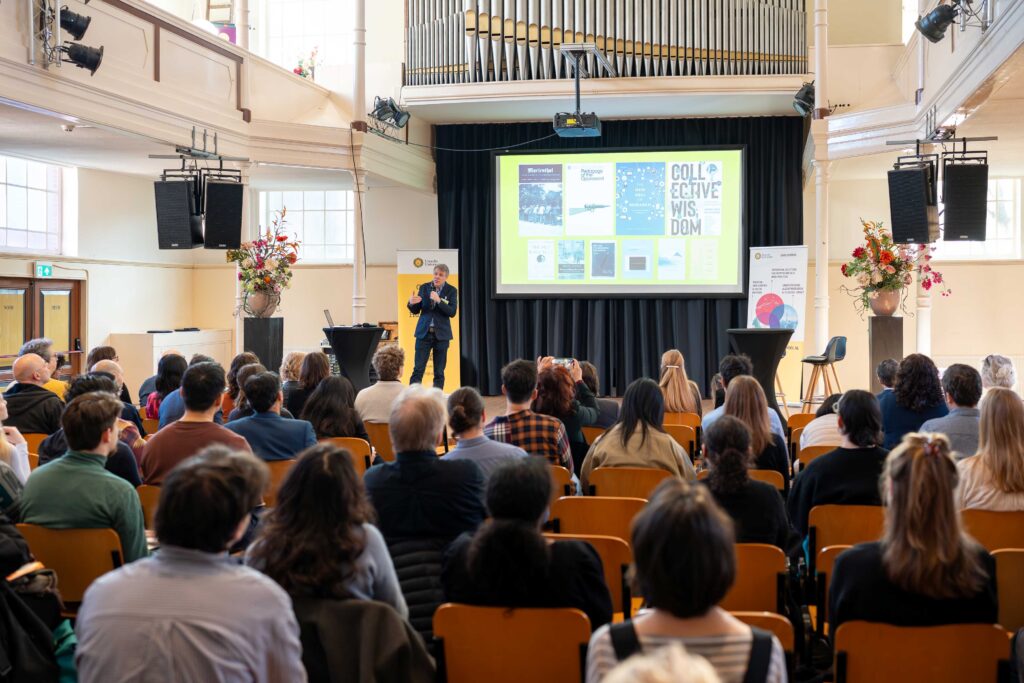
The academic as a ‘critical friend’
Next, Prof. Rob Kitchin delivered a keynote titled Performing Critical Data Studies from the Inside: Working with Government to Change Data Regimes, where he put forward the idea of the academic as a ‘critical friend’ – someone who both advocates for evidence-based societal interventions and remains critically aware of their own embedded role. All the while acknowledging that all academic work is, at its core, political – even if implicitly so. Drawing on his own experience working closely with state bodies, Kitchin shared reflections on the challenges and rewards of insider roles, specifically that they demand trust, relationship-building, and patience, and that they come with compromise, ethical tensions, and complexities. Yet, such roles are essential for influencing policy and shaping data-driven programmes and infrastructures in genuinely collaborative ways.
Impactful education: a win-win?
Following the keynote, a panel discussion took place on Impact & Education: How Collaborative Research Informs University Teaching, moderated by dr. Vincent Crone. Panellists dr. Hieke Keuning, Prof. dr. Arjan van den Born, Thomas Boeschoten, and Sharon van Geldere explored how university curricula could better support collaboration between academia and industry. They discussed practical ways to bridge this gap, such as integrating real-world cases from external partners into student projects to highlight the value of the learning process over solely delivering a final product. The conversation also addressed the benefits of such collaborations, namely broadening students’ horizons beyond the academy and, along the way, helping them build professional networks, developing fundamental soft skills, and tackling real-world issues. The panel also addressed key challenges, particularly the gap between what academia deems relevant and what external partners need, and considered how this divide might be navigated to achieve impactful collaborations.
Working with all voices in times of technological change
The first day wrapped up with four parallel workshops, each offering hands-on exploration of different facets of collaborative research:
- Multiple-Stakeholder Workshop as a Research Method for Policy-Making
Led by dr. Noella Edelmann, dr. Mariana Lameiras, and dr. Lucille Tetley-Brown, this session used role-playing exercises to explore how workshops can serve as a method for collaborative research. Participants reflected on both the strengths, such as bringing diverse stakeholders together around shared matters of concern, and the challenges, such as potential biases, partiality, and the difficulty of making sure that all relevant voices are both included and heard. - Beyond Superficial Impact Narratives: Identifying Your Own Values, Vocabularies, and Pathways
In this session, Prof. dr. Annette Markham engaged participants in speculative design thinking exercises through prompts that sparked collaborative reflection. Together, attendees explored alternative vocabularies for conceptualising impact beyond instrumental approaches, with terms such as ‘constellations’, ‘care-full’, and ‘response-ability’ emerging from the dialogues. They also experimented with creatively reimagining the impact narratives of their research projects, focusing on the pillars of user/audience, societal need, application/use, and benefits/outcomes. - Team Science: How to Build and Run Transdisciplinary Research Teams
In this hands-on session, dr. Judith Kamalski and the Brightlands Institute for Smart Society (BISS) team brought participants into an active, role-based exercise. Each attendee stepped into a specific role, ranging from data scientist and ethics researcher to medical expert, funding representative, and citizen. Drawing on concrete case studies, the groups explored how to strengthen interdisciplinary collaboration among team members with diverse forms of expertise, while cultivating impactful relationships with stakeholders across academia, industry, and government. - Co-creating Approaches to the Responsible Use of Emerging Disruptive Technologies
Organised by the Ethics of Socially Disruptive Technologies (ESDiT) research programme, this workshop brought together participants and invited experts in AI, data, and ethics from public sector organisations, universities, and research institutions. Speakers included Giulia Bössenecker, Thomas Boeschoten, and Patricia Reyes Benavides; ESDiT scholars dr. Andreas Spahn and dr. Carina Prunkl offered responses to the speakers. Through rich dialogue and practical exercises, the group delved into the societal implications of emerging technologies, with a focus on the concepts and values that underpin our current moral, political, and anthropological frameworks, working collaboratively to understand what collective responsibility can look like in the face of disruptive technological change.
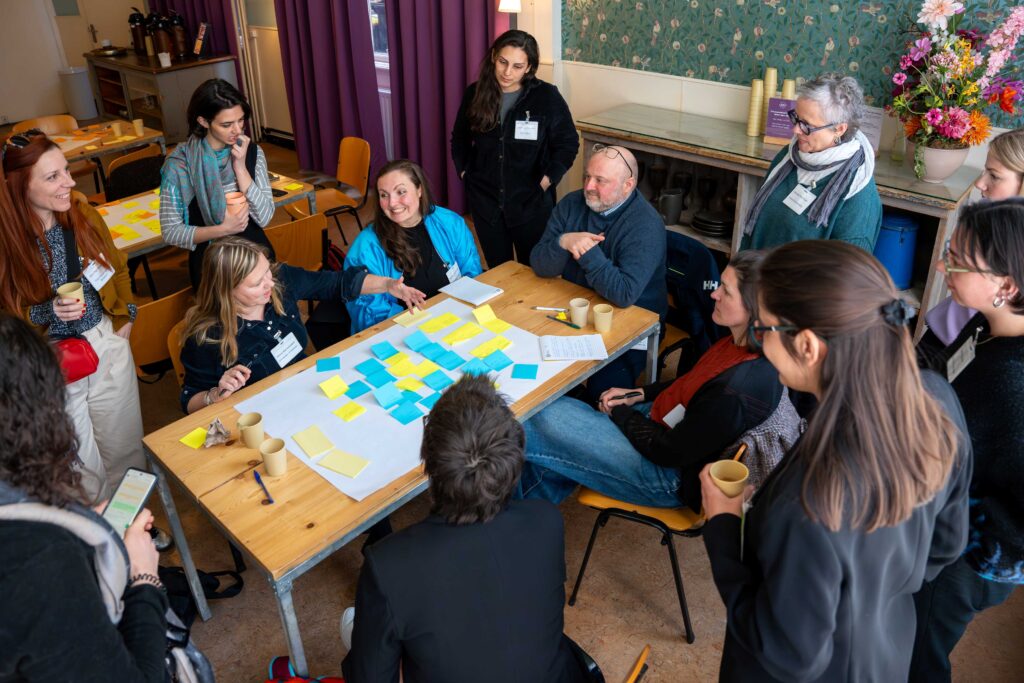
An optimistic and hopeful vision for the future of tech
The second day of Data School’s Impact Conference opened with a keynote by Prof. dr. Payal Arora titled Building Inclusive Tech with the Global South. At the heart of Arora’s keynote was a mindset she described as ‘rational optimism’. She observed that much of the Western world currently finds itself in a state of deep pessimism, where dominant narratives paint AI as a force that will take our jobs, oppress us, and ultimately act against humanity itself. This outlook, she argued, fosters feelings of guilt, helplessness, and an increasing impulse to opt out. In contrast, Arora drew attention to the Global South, where a more hopeful, forward-looking attitude is taking shape, with communities actively shaping AI’s trajectory by creating ‘platforms of hope’. This spirit of optimism feeds into what Arora described as ‘pedagogies of hope’, where the approach shifts from training to more holistic forms of teaching and decentralised learning. At the heart of this lies the basic human need to be seen, to be heard – something that defies the cold calculus of instrumentalization. As Arora concluded, “we are human beings” – and our shared humanity must remain central in shaping the technological futures we envision.
Breathing spaces for critical reflection and shared visions
Following Arora’s keynote, Prof. Minna Ruckenstein took the stage with a keynote titled Collaborative Explorations as ‘Breathing Spaces for Digital Futures’. Ruckenstein advocated for the intentional creation of ‘breathing spaces’ – open, flexible environments where reflection, dialogue, critical inquiry, and reorientation are made possible amidst the rapid pace of technological change. Her keynote centred on three intertwined modes of engagement:
- ‘creating trouble’, by interrogating the entrenchment of power within technological systems;
- ‘composing futures’, by moving beyond critique to imagine and articulate viable alternatives; and
- ‘securing breathing space’, by pushing back against the relentless drive for productivity and efficiency, and making room for thoughtful reflection and the shared envisioning of pathways forward.
As Ruckenstein put it:
“In a world defined by uncertainty and a lack of systemic understanding of what is going on, breathing space protects the ability to think, plan, and anticipate what needs problematizing. By embracing this approach, it is possible not merely to observe and criticize digital society-making, but to learn about its composition and breathe life into it.”
Prof. Minna Ruckenstein
Measuring the value of collaboration
The day continued with a panel discussion on Measuring Impact, moderated by dr. Mirko Tobias Schäfer. Panellists dr. Madelijn Strick, dr. Tjitske Holtrop, and Nicole Ward-Boot shared their perspectives on impact. These perspectives ranged from making a tangible positive difference to influencing knowledge, attitudes, and behaviours, and fulfilling ambitions within organisations, academia, or society at large. While they recognised the intricacies of measuring impact, they emphasised that this complexity should not hold us back from seeking to understand the value of our work – seeing how each small gesture we make connects and accumulates into a larger whole. Metrics, they agreed, have their place; but they are means, not ends. Ultimately, measuring the impact of what we do, how we do it, and who we do it for, begins with a clearly defined goal and purpose – one that extends beyond the towers and benchmarks of academia alone.
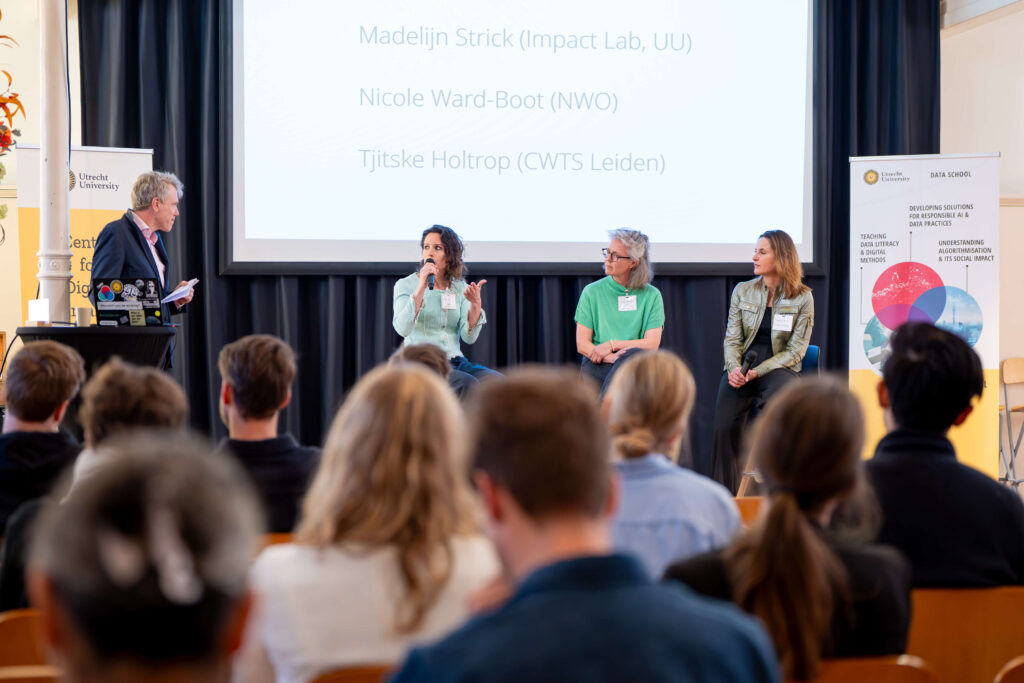
Designing ethical digital futures and research
The second and final day of Data School’s Impact Conference concluded with a rich set of four parallel workshops:
- Gen(der)AI Safety
Led by Prof. dr. Payal Arora, dr. Kiran Vinod Bhatia, and dr. Marta Zarzycka, this session invited participants to engage in three hands-on exercises – ‘data to design’, ‘data to policy’, and ‘data to literacy’ – all focused on the urgent issue of ‘deepfake pornography’, or AI-generated non-consensual intimate content. Through collaborative activities and plenary discussions, participants examined strategies for preventing, detecting, and responding to AI misuse. This investigation was done through the lense of fundamental ethical principles such as accountability, fairness, equity, and the right to understand. - Enhancing Collaborative Research Through Design Thinking Methodologies
In this interactive session, dr. Roxanne van Giesen and Mara Verheijen led participants through a series of interconnected design thinking exercises. From empathising with user needs and clearly defining problems, to brainstorming, prototyping, and testing – the session demonstrated the productive role of design thinking in collaborative research. It also showed participants how this type of thinking leads to richer insights, sparks creativity, opens space for diverse perspectives, and helps shape solutions that are both practical and user-responsive. - Bridging Gaps: Advancing Recommender Systems through Academia-Industry Collaboration
This workshop unfolded in two parts. First, dr. Dennis Nguyen and Arie-Bart de Vries explored how the interplay between professional values, organisational goals, and technical possibilities shapes the implementation of algorithms for media content distribution in news recommender systems. Then, Joris Veerbeek and Eva Hofman examined how TikTok algorithms intersect with issues such as eating disorders. Participants engaged with these two case studies of academia-industry collaboration, working through exercises that approached recommender systems both as ‘sociotechnical interventions’ and as subjects of ‘critical, investigative inquiry’. - Navigating AI Ethics in Media: A Hands-On Workshop with DEDA
Facilitated by dr. Karin van Es and Jeroen Bakker, this session introduced participants to a prototype of the Data Ethics Decision Aid (DEDA) for Media. This toolkit (currently under development) is being designed to support media organisations in navigating the ethical complexities inherent in AI and data-driven projects. Through hands-on engagement with the prototype, participants explored how DEDA can help identify ethical dilemmas, structure internal deliberations, and document decision-making, thereby strengthening accountability to both stakeholders and the public.
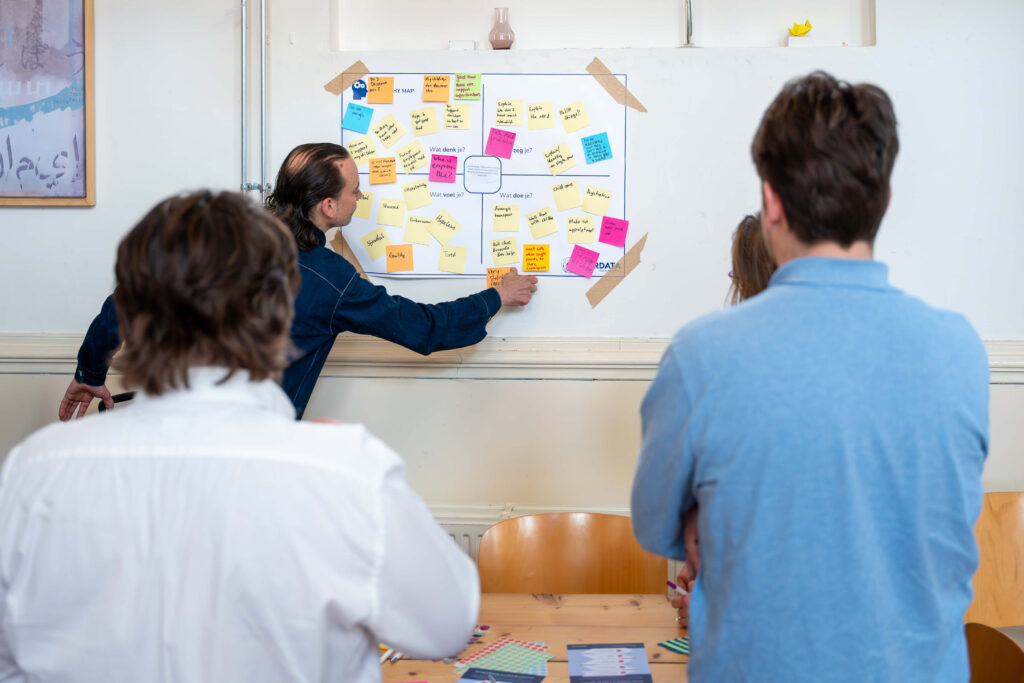
A word of thanks from Data School
A heartfelt thank you to everyone who made Making a Difference: Societal Impact through Collaborative Research such an inspiring, thought-provoking, and joyful event. You brought the sessions to life with rich, creative, and productive explorations of how collaborative research can engage with, and is vital to, the intricacies of our datafied society. Your presence, participation, care, curiosity, openness, and a genuine willingness to be surprised made all the difference. As one attendee beautifully put it, there was space to think, act, and imagine otherwise, leaving many of us feeling radicalised and hopeful.
Thank you all: contributors, attendees, volunteers, photographer Daan Jeurens, graphic recording professional Norbert Vermeer, and venue hosts – for spinning in this orbit of collaboration, knowledge exchange, and difference-making with us. It was truly an honour!
